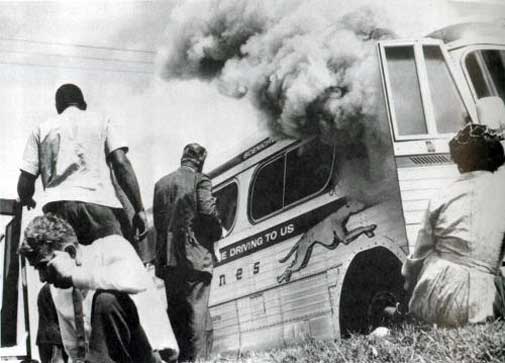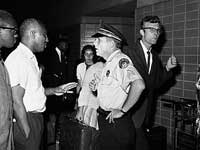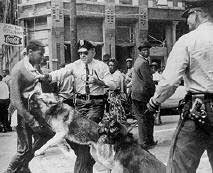
The newest PBS American Experience documentary, Freedom Riders, tells of a key moment in the history of the Civil Rights movement that took place 50 years ago -- yet tells it in such a gripping, present-tense way that it plays more like a retro episode of 24. Premiering tonight (Monday, May 16) at 9 p.m. ET (check local listings), it's a two-hour history lesson that's as exciting as it is important...
Writer-producer-director Stanley Nelson (who also gave us, among other things, The Murder of Emmett Till), recreates the history and impact of the Freedom Rides by gathering participants, politicians, historians, photos, news footage and civil-rights songs -- and letting the story, and the life-and-death drama, unspool chronologically and patiently.
So we watch as a simple idea -- a group of integrated civil-rights activists boarding a pair of public busses for a trip through the Deep South, with the intent of challenging segregation laws at bus stations and diners along the way -- mushrooms into a national crisis.

What one person calls "a stroke of genius" -- that participants were trained in, and committed to, nonviolence as a response to whatever violence they might face -- leads quickly to what, at first, seems like a foolhardy, almost suicidal mission. Of the two busses that embarked on the original Freedom Ride in May 1961, one was stopped, surrounded and set ablaze by members of the Alabama Ku Klux Klan.
Student activists from Nashville picked up the mission at that point -- and one young student, Diane Nash, was a primary force behind that effort. She's interviewed anew in Freedom Riders -- as is John Seigenthaler, at the time an assistant to then-Attorney General Robert F. Kennedy, who phoned her to dissuade her from continuing the Freedom Ride because people might get killed.
Her response to his warning, as he recalls it, is one of the many remarkable moments in Freedom Riders. Seigenthaler, in fact, is a wonderful guide through this story, and he's buttressed by literally dozens of others.

And those who don't speak for themselves are represented in footage, from President John F. Kennedy and brother Bobby, who are led by the Riders to confront and support the civil rights movement, to Birmingham, Alabama public official (and vehement racist) Bull Connor.
Freedom Riders is intensely told, and, once seen, will not be forgotten. Based in part on the work of one of its interviewees -- Raymond Arsenault, author of Freedom Riders: 1961 and the Struggle for Racial Justice -- it deserves to be equated to another PBS masterpiece about the civil rights movement, Eyes on the Prize.
It's that good.
And after you've seen it on PBS, you can buy it HERE, to add it to your own video library.